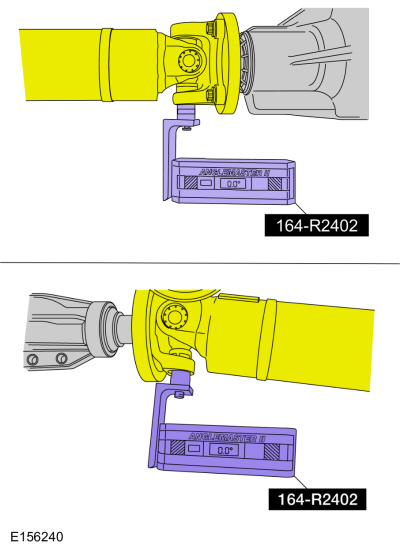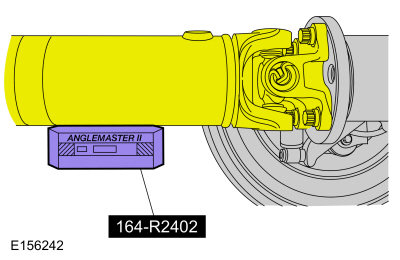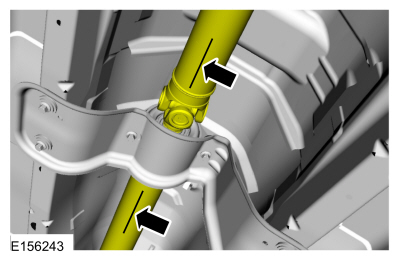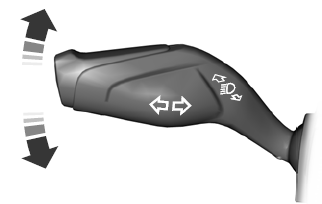Ford Fusion: Driveshaft / Driveshaft Angle Measurement. General Procedures
Check
NOTE: This procedure does not apply to CV joints, flex couplers or double cardan joints that are used in some driveshafts. This check is for single-cross and roller-style joints found in the driveshafts.
NOTE: Prior to checking driveline angularity, inspect the U-joints for correct operation.
NOTE: An incorrect driveline angle can cause a vibration or shudder.
NOTE: Driveline angularity is the angular relationship between the engine crankshaft, the driveshaft and the rear axle pinion. Factors determining driveline angularity include ride height, rear spring and engine mounts.
-
NOTE:
- Special Tool(s): Anglemaster II Driveline Inclinometer/Protractor 164-R2402. Carry out the following preliminary setup steps:
-
Inspect the U-joints for correct operation.
-
Park the vehicle on a level surface such as a drive-on hoist, or back onto a front end alignment rack.
-
Verify the curb position ride height is within
specifications with the vehicle unloaded and all of the tires are
inflated to their normal operating pressures.
-
Calibrate the Anglemaster II Driveline
Inclinometer/Protractor by placing it on a clean, flat level section of
the frame rail and press the ALT-ZERO button.
Vehicles with flat-flanged, split-pin or slip-flanged U-joints
-
NOTE: If equipped, remove the snap ring to allow access to the base of the U-joint cup. Make sure the Anglemaster II Driveline Inclinometer/Protractor is seated against the U-joint cup.
NOTE: Rotate the driveshaft until the flange U-joint cup is parallel with the floor. This will simplify taking measurements.
Special Tool(s): Anglemaster II Driveline Inclinometer/Protractor 164-R2402. Check and record the flange angle as angle A.
 |
-
Special Tool(s): Anglemaster II Driveline
Inclinometer/Protractor 164-R2402. Measure the slope of the connecting
component. Record the measurement of the component angle as angle B.
 |
Multiple piece driveshafts
-
NOTE: Repeat this step for each center support bearing on the driveshaft.
NOTE: It is not necessary to remove the U-joint snap ring, if equipped, for these measurements.
Special Tool(s): Anglemaster II Driveline Inclinometer/Protractor 164-R2402. Measure the slope of the components in front and behind the center support bearing U-joint in the area indicated. Record the front component as angle A and the rear component as angle B.
 |
All vehicles
-
NOTE: When 2 connected components slope in the same direction, subtract the smallest number from the larger number to find the U-joint operating angle. When 2 connected components slope in the opposite direction, add the measurements to find the U-joint operating angle.
Calculate the difference in the slope of the components to determine the U-joint operating angle.
-
NOTE:
- The U-joint operating angle is the angle formed by 2 yokes connected by a cross and bearing kit. Ideally, the operating angles on each connection of the driveshaft must:
-
be equal or within one degree of each other.
-
have a 3 degree maximum operating angle.
-
have at least one-half of one degree continuous operating angle.
-
If the angle is not within specifications, repair or
adjust to obtain the correct angle. Inspect the engine mounts,
transmission mounts, center support bearing mounting, rear suspension,
rear axle, rear axle mounting or the frame for wear or damage.
 Driveshaft Runout and Balancing. General Procedures
Driveshaft Runout and Balancing. General Procedures
Special Tool(s) /
General Equipment
100-002
(TOOL-4201-C)
Holding Fixture with Dial Indicator Gauge
Inspection
NOTE:
Driveline vibration exhibits a higher frequency and lower
amplitude then high-speed shake...
 Rear Driveshaft. Removal and Installation
Rear Driveshaft. Removal and Installation
Special Tool(s) /
General Equipment
Flat-Bladed Screwdriver
Punch
Copper Hammer
Removal
NOTE:
The max articulation of any CV is 10 degrees...
Other information:
Ford Fusion 2013–2020 Service Manual: Speaker Audio Test. General Procedures
Activation NOTE: The procedure used to download the audio files varies, depending on the web browser used. Using a suitable web browser, download all of the diagnostic sound tracks to a suitable USB drive. 125Hz Sample 100Hz Sample 80Hz Sample 63Hz Sample 50Hz Sample 40Hz Sample ..
Ford Fusion 2013–2020 Owners Manual: Wi-Fi Hotspot
Creating a Wi-Fi Hotspot You can create a Wi-Fi hotspot in your vehicle and allow devices to connect to it for access to the Internet. Press the button to enter the settings menu. Select Connectivity Features. Select Vehicle Hotspot.Note: The vehicle hotspot default setting is on. Select Settings. Make sure that you have Wi-Fi visibility switched on.Note: The Wi-Fi Visibility default s..
Categories
- Manuals Home
- 2nd Generation Ford Fusion Owners Manual
- 2nd Generation Ford Fusion Service Manual
- Powertrain
- Load Carrying
- Engine
- New on site
- Most important about car
Direction Indicators. Interior Lamps
Direction Indicators

Push the lever up or down to use the direction indicators.
